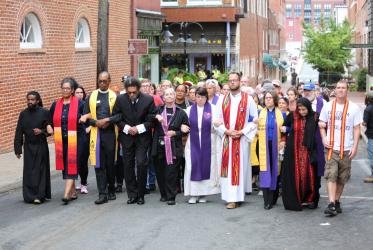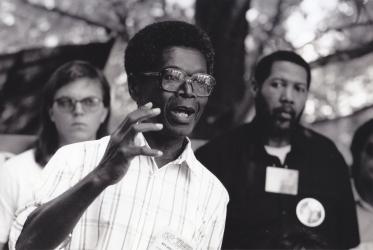Calling Nelson Mandela a leader with hard-won wisdom and maturity unparalleled in our time, the World Council of Churches (WCC) general secretary gave thanks to God for Mandela’s life, which he described as a gift to South Africa and the whole world.
A renowned anti-apartheid activist and Nobel peace laureate who served as South Africa’s first black president, Mandela, 95, passed away on Thursday 5 December at his home in Houghton near Johannesburg.
“He will be recalled as the leader who acted to unify a nation once deliberately divided along the lines of race,” said Rev. Dr Olav Fykse Tveit, the WCC general secretary. Tveit added that Mandela was a “liberator who by force of his remarkable personality raised the dignity of Africans after centuries of colonialism, oppression and discrimination.”
Tveit described Mandela’s relationship to the WCC as a special one, recalling Mandela’s visit to the WCC Geneva offices in 1990 soon after his release from prison. This is when he expressed his gratitude for the churches’ support to the anti-apartheid struggle.
As South Africa’s president, Mandela addressed the WCC’s 8th Assembly in Harare, Zimbabwe in 1998. He praised churches’ efforts against apartheid in South Africa, as well as missionaries for bringing high standards of education to Africa from which he benefitted as a child.
Mandela said, “… you have to have been in an apartheid prison in South Africa to appreciate the further importance of the church. They tried to isolate us completely from the outside. Our relatives could see us only once every six months. The link was religious organizations, Christians, Muslims, Hindus and members of the Jewish faith. They were the faithful who inspired us.”
“The WCC’s support exemplified in the most concrete way the contribution that religion made to our liberation,” he added. In his concluding remarks at the assembly, Mandela paid missionaries the compliment of saying that by their faith and action they shared in the “distinction of immortality” as “men and women whose names will live beyond the grave and down the centuries.”
In her reaction to Mandela’s death, Dr Agnes Abuom, moderator of the WCC’s Central Committee, said, “We thank God for giving us Mandela for 95 years. Through his life and works he has become an icon of dignity and freedom for all human beings.”
“We will remember Mandela for his forgiveness he extended to his enemies and the perpetrators of apartheid, a quality very rare among many world leaders today.”
“Our prayer is all that Mandela stood for may become part and parcel of our global values for justice, peace and dignity for the whole humanity,” added Abuom.
Mandela’s life was also described by the WCC’s general secretary as “consistent with the best teaching of his Christian educators and the ecumenical movement”. Calling him one of the most deserving Nobel peace laureates, Tveit added that Mandela’s ideals inspired freedom from apartheid and transformed his country during his presidency.
“I am convinced that it is entirely accurate to say of him that his name ‘will live beyond the grave and down the centuries.’ Indeed, as is said in the Orthodox tradition of Christianity: May his memory be eternal!” Tveit concluded.
The WCC general secretary will be available for comments via the WCC media contact: +41.79.507.6363.
Read full text of the WCC general secretary's tribute to Nelson Mandela






